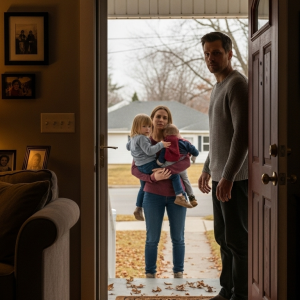My girlfriend dropped out of college two years ago. Since then, she has become a shadow of her former self, and our life together has become unbearable. I know that sounds harsh, but I work 50 to 60-hour weeks as a nurse to sustain us because, in her words, she’s “too pretty to work.”
Just today, I came home at 6 PM to find her still in bed, surrounded by a fortress of half-eaten takeout boxes. She hadn’t showered or brushed her teeth. The only time she’d moved was to open the door for another delivery. After a brutal day at the hospital, seeing this tipped me over.
I raised my voice, telling her she couldn’t live like this. In response, she didn’t just argue; she became physically violent. I wanted to end it right there, but she immediately began to guilt-trip me, weeping about how she has no one else to turn to.
She stayed in bed for the rest of the day. A few hours later, I walked into her room, my resolve hardened. “I can’t do this anymore,” I said. “I don’t care who you turn to, but for my own mental health, I cannot be with you.”
The guilt-tripping started again, but when it didn’t work this time, a switch flipped. She scrambled out of bed, ran to the kitchen, and grabbed a pair of scissors. She held them to her own throat and threatened to end her life.
I didn’t risk calling her bluff. I agreed to stay. She’s currently sleeping, and I’ve made a decision. I’m going to break up with her tomorrow. If she does that again, and goes through with it, it will not be my fault. I don’t care anymore.
Last night, as we were getting ready for bed, I remained fully clothed. I just stood there and told her we needed to talk. At first, she was smiling, thinking it wasn’t serious. But the mood eventually settled, and she saw the look on my face.
“Something isn’t right anymore,” I began. “I’ve tried to be patient for the past two years, but I don’t know how much more time I’m willing to spend waiting for you to get a job, go back to school, or even just get a hobby.” I told her it disgusted me that she didn’t seem to care about herself, that she had no goals or aspirations.
For the first time in a long time, she was completely attentive. To my surprise, she agreed with everything, even offering suggestions on where she could apply for jobs and what courses interested her. For a moment, it seemed like she might finally change. It made the next part even harder.
“I don’t love you the same way,” I said, the words feeling like stones in my mouth. It eventually led to me admitting I felt nothing at all about the relationship. I was jaded, tired, and I wanted a fresh start.
When she realized what I was truly saying, she started to cry. “Why didn’t you mention this sooner?”
“I have,” I said. “I’ve always asked you to cook, to go out with me, to try something. I even offered to pay for your classes.”
She understood that part but was hysterical that I didn’t explicitly state it was causing my love for her to fade. She apologized, talking about her poor mental state, her lack of motivation, and how the only thing she looked forward to was me coming home. None of it affected me, other than making me feel deeply uncomfortable.
She begged for another chance. “Give me two months,” she pleaded, snot and tears streaming down her face. “Two months to make a change. I promise, I promise I’ll change.”
I never wanted to make her homeless, so this seemed like a fair settlement. She would have two months to get on her feet before we officially separated. But she pushed back on one point.
“Just give me one month,” she begged. “One month to try and fix the relationship. What can I do to make you love me again?”
She looked like she was about to break down completely. To avoid another crisis, I agreed. “Okay. We’ll see how things are in a month.” In my mind, this one month was just to give her time to accept the inevitable breakup.
I slept on the couch. At 3 AM, she came out and slept on the floor beside me, sobbing quietly under her blanket. It was one of the hardest things I’ve ever had to do, but letting everything out, I regretted nothing.
A few nights later, we sat down to talk again. She asked me when I completely lost my love for her. I told her it was never one single moment, but a slow erosion of feeling.
“When did you feel the most angry?” she asked.
I thought for a few minutes, then the words started to come out. “It was when I first started at the hospital. The tempo was brutal. Constant work, constant learning. It was the most stressed I’ve ever been. And I think that’s when I started losing feelings the fastest. Seeing you at home, doing absolutely nothing. Coming home to no food cooked, no job, no new skills—just completely glued to the internet with nothing to show for it.”
“It disgusted me,” I said flatly.
She asked why I didn’t make it a bigger issue then. “Because some things shouldn’t have to be said!” I told her, my voice rising. “I shouldn’t have to remind you to wash yourself, to eat, to do something other than mindlessly scroll on your phone for hours every single day! The last thing I wanted after a stressful shift was to come home and beg my girlfriend to be a functional person.”
I told her when she dropped out of nursing school, I was upset because I knew she was capable. But over time, I realized that with the kind of person she was, there was no way she could have ever finished. “That’s why I suggested easier jobs, less demanding majors. I would have appreciated it if you had just cooked or found a hobby. But you chose to do nothing for years.”
“Do you hate me?” she asked, her voice trembling.
“I don’t know,” I said honestly. “You are loving and kind. But I hate how you’ve handled your life. I feel no ill will, but I also feel nothing else. I’m just done.”
She locked herself in our room for the rest of the day. The next day, she told me she thinks she’s depressed. She showed me a list of hobbies she wanted to try—photography and cooking—and proof she was applying for entry-level jobs online.
She asked if she changed her behaviors, would I give her another chance? I repeated my terms: in one month, I would see how I felt, but there was no guarantee my feelings would return. Frustrated, she accepted.
My girlfriend was very proactive the first week. It was a manic influx of energy. She threw herself into photography, buying a camera by selling some of her old clothes. She constantly asked me to go out into the city with her to take pictures, and I kept my promise to match her effort, even after long shifts.
Her behavior changed, however. While she was always affectionate, it was now turned up to the maximum. She asked me how I was doing maybe eight times a day. Her public displays of affection were constant. I don’t know if it was exactly love bombing, but with the energy she was putting out, I was fully expecting a crash.
And it came.
During the second week, I was emotionally and physically drained. My friends at work, the only other people I confided in, warned me again. “You’re being love bombed,” they said. “You look more tired than usual.” They insisted I go out with them over the weekend to clear my head. I agreed.
Naturally, my girlfriend was disappointed we couldn’t spend the day together, but I promised we would spend all of the next day together. When I came home, she was in a brooding mood. I had been dismissive, she said, uncomfortable with her constant need for affirmation and affection. She felt I wasn’t putting in the same effort.
This might have been the point where better communication could have avoided what came next. But instead, I took the time to nap and be alone, something I hadn’t had in over a week.
The next day, the breaking point occurred. I left for work without speaking to her. I had a genuinely good day at the hospital and joined my coworkers for dinner and a few drinks afterward. I arrived home late, around 9 PM.
I walked in to find her sitting in the living room in the dark, just staring at the wall. It startled me.
“Where have you been?” she asked, her voice flat.
“Out with friends from work,” I said. I admitted I’d had a few drinks.
There was a long, uncomfortable silence. Then she brought up the one-month deadline. “Have your feelings changed?” she asked.
The question caught me off guard. “I appreciate your efforts,” I said carefully, “but I’m still unsure of our future.”
Her composure finally broke. Her voice trembled as she accused me of not smiling when we were out, of being quiet and distant. I tried to explain I was just tired, but I don’t think she believed me.
Then came the full breakdown. Through tears and a broken voice, she told me how much she loved me, how much she had given to the relationship, only for me to throw it all away. She accused me of using her lack of ambition as an excuse to end things, questioning if I ever really loved her at all.
She went on, her voice escalating to near-screaming, saying there would be nothing for her if I left. No one, no place, no future. Her will to live would be gone. There was nothing I could say. I just froze, witnessing her fall apart on a level I had never seen before.
After everything was said, she locked herself in our room and stayed there for days.
A few days later, she emerged, calm and extremely apologetic. But the time I’d spent alone had given me the clarity I needed. I did what I should have done a month ago.
As gently as I could, I told her it was over. There was no chance we could be together. I would let her stay for an additional two months, rent-free, until she could find a job and get on her feet. She cried again, but in a much more defeated manner, and agreed.
A week later, she got a part-time job at a supermarket. Our speaking terms were more or less dead. She spent her off-time in her room alone. It feels selfish to say, but for a short time, I felt extremely free.
Then, everything crashed down on me. I contracted pneumonia.
For about two weeks, I was severely ill and off work. My lungs felt at 50% capacity; I couldn’t take a deep breath without a fit of coughing. I was sleeping 12 to 14 hours a day.
Seeing how sick I was, she started to occasionally check on me. I hated that being sick forced us to interact. Not even a week after we had broken up, I had to depend on her. I wasn’t well enough to get groceries, so she insisted on buying them with her own money. She began to cook for me, actual meals, even when I said I didn’t want anything.
During the second week of my illness, she started to sit with me while I was awake. She told me about her day at work, her coworkers. It felt different. It went from talking, to watching TV together on nights I couldn’t sleep, to us just talking about our issues, the things we’d held back for so long. It was extremely cathartic. There was no yelling, just listening. We hadn’t talked like that since we were friends, years ago.
One day, when I was at my worst, she didn’t go to work. She stayed beside me for hours, not talking, just making sure I was eating and drinking water. I can’t convey in words how those two weeks made me feel. It was a lot of time to think.
Since I’ve recovered, the transition from being in a relationship to being friends has felt more apparent, more organic. She spends less time in her room and more time in the living room with me when I get home. But there’s still a barrier between us, something formed from our final argument.
The end of September approached quickly, and my lease was set to expire. I had made my decision. I wasn’t renewing it.
On the last Saturday of the month, I told her it was time for me to leave. I explained that I needed to focus on myself, that living together was no longer an option.
The argument erupted almost immediately. She accused me of abandoning her, of throwing away our love for no reason. As the argument escalated, she became more frantic. I could see the pain and anger in her eyes, and it turned into something frightening.
In a moment of rage, she lunged at me. I didn’t see it coming. She struck me across the face.
I stumbled back, shocked. Realizing what she had just done, she froze, her expression shifting from anger to panic. She started to apologize, but I felt the sharp sting of betrayal.
I left the apartment to clear my head. I ended up at a nearby hospital after a friend insisted I get checked out. The doctors confirmed I was fine physically. After a few hours of reflection, the reality of our situation was clearer than ever.
I sent her one last message. I told her I wouldn’t be pressing charges, but that she needed to stay away from me forever. I reminded her that she had a lifeline, but she needed to use it wisely. I wanted no more contact.
I hit send and felt an odd sense of calm wash over me. It was finally over.
I packed my things the next day and moved out. I left behind the memories, the arguments, and the love that had once existed. As I closed the door for the last time, I didn’t look back. It was time for me to start fresh.




